 |
[September 21th 2004]
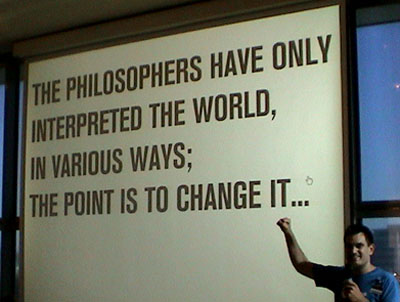
TIMESHIFT: Interview With Josh On
Josh On is a free-lance designer living in San Francisco.
He is best known for his collaboration with the design studio Futurefarmers
and as the maker of the web project They Rule, which is an interactive
mapping system that visualizes the interconnections between the board members of the most powerful
companies in the US. They Rule won the prestigious Golden Nica award
at the Ars Electronica Festival in 2002. At the Ars Electronica
festival this year, Josh On took part in the 'Language of Networks'
conference where he spoke about classes and networks. Sebastian
Campion talked to him afterwards.
They Rule became an instant classic when you released
it and it still is one of the most referred-to internet projects
within the media-art community. Did you expect this kind of success
- and why do you think it became so popular?
I was excited about They Rule when I was first making it because
it was very captivating data. I knew that I had the right skills
to
do it so I thought it would be a success on my own terms. I think
it was the right-project-at-the-right-place kind of thing. It came
out 6 months before 9/11 at a time when the world was becoming a
much more political place. There was a rise in the antiglobalization
movement, there were more and more interest in social networks on
different fronts and there was the dotcom crash. I think people
were looking for anything that was exciting, that was happening
on the internet and wasn't commercial.

They rule
Perhaps people were also looking for an information visualization
project that focused on other aspects than aesthetic representations
of computer data?
Yes, exactly. There had been a whole lot of projects which really
- I don't want to say were contentless - but were much more
concerned with visual form.
Were you ever inspired by any of those?
Yeah, sure! I love some of them. I like pretty stuff as much as
anyone does.
Can you say a few words about your new project Exxon Secrets,
which resembles They Rule quite a bit.
My wife Amy Balkin and I worked on it for Greenpeace. They came
up with all the data and approached us to visualize it ... and that
was tricky. We actually wanted to do a thing that was not like They
Rule at all. We started playing with the data, trying to find ways
to present it but Greenpeace definitely had They Rule in mind. We
presented a lot of different things but they chose a way that looked
a lot like They Rule, although it is slightly different. Exxon Secrets
is oriented towards journalists, so it wasn't trying to be too cool
for school, which They Rule is a bit. It is more usable in some
ways. It announces what it is about and explains itself a lot more.
Greenpeace is going to continue updating the site and in fact that
was a major part of the project for us. We built it backend so that
Greenpeace could keep the database up-to-date which isn't in They
Rule.
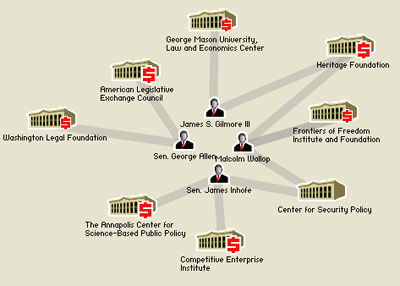 Exxon Secrets
Exxon Secrets
Did you ever consider taking They Rule further - such as including
a way for users to interact directly with the
companies and people that it maps? I am thinking of info-warfare
tactics as carried out by culture jammers and hacktivists like The
Yes Men, Electronic Disturbance Theatre, etc.
You mean to be more proactive and getting people involved politically
around that? Well, I haven't put much thought to that but I am sure
there's a lot of different things you could do. But I think the
reason why I haven't pursued the path is that I really think that
the way we are going to move forward in social movements is less
around art-pranks and more on good social organizing with one another
in real life. Organizing conferences, organizing protests, organizing
places where people can come together to debate ideas and stuff
like that. I think that's where the key is to changing the world.
I don't necessarily see They Rule as a launch point for that, although
I am sure there's a lot of interesting things to be done in that
field.
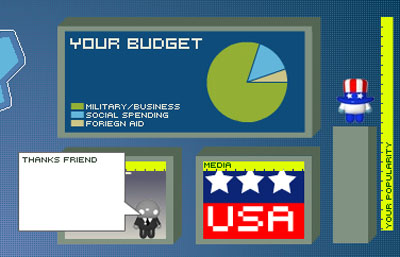
Anti-Wargame
Still, I guess some of the projects that you are involved in,
such as Anti-Wargame and They Rule, can be employed as
strategic ways of engaging people - especially within the internet
design community?
Hmm... I don't know...
...or perhaps I should say, that is how I perceive them.
Right, I wonder if that's true at all. I don't know if it is. I
think these things aren't necessarily building anything directly.
They are
very amorphous so it's hard to evaluate their success. I don't know.
I am suspicious that they're not that successful. They're more personal
outlets for some of the stuff that is going on. But really, the
emphasis of my activism is in old ... you know ... most of my time
right now outside of work, is not spend designing these projects
- it is spend helping organize regular political events and
things.
The designs are not meant as political tools to somehow awaken
people?
I don't like to use the term awaken people because I don't think
people are asleep necessarily. A lot of people say that, right?
-
Wake up, wake up! Don't you see this world is crazy?! 30,000
people are dying every day! etc, etc ...
Well, people know this! People are living this. People are having
terrible healthcare and don't have any job security and things are
falling apart around them and they are getting drafted to go off
to war, etc. So, it's not a matter of waking up. I think it is a
matter
of having some clarity and some hope about how we can actually change
things. I think that's what has disappeared in society.
Any hope that we could actually come together and organize a better
world. I think people have given up on that - although
people never give totally up on it. There will always be resistance
- and that's great and it's through that resistance that we'll gain
hope again. In these hard times that's what we need to help organize
that resistance and point out that there's been dark times before
and we'll get out of them. So fitting into that ... I think that
these designs are very small contributions to the propaganda. I
sell socialist papers on the street corners. That's what I do. Every
Friday morning and Wednesday night and I think that is a more effective
way of having fruitful conversations and bringing people into politics.
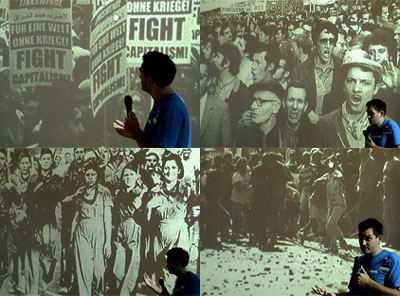
I am still curious about the link between your work as a designer
and as an activist.
Yeah ... ha-ha ... me to. I think I am compelled to do the other
stuff because I can. You know, I have these ideas and then I am
like "that's a good idea, I should do that" and then I
want to do it because it's fun essentially. Like, They Rule, there's
a lot of
interesting things that I wanted to work out. It is both an input
and an output. This was interesting and fascinating to me. There's
always new problems to solve in information visualization. But I
am loath to justify it ... or making big claims that I think it
is going to change the world or that we need to be making more designs
or websites like this. Because this is ... and I hate to sound
hypocritical, but I don't think this is what we need to be doing.
I think design is very important. Whether it is a political thing,
that's a different question. Designers were always important and
always will be. Things have relevance beyond their political content,
obviously, and I don't want to put down designers. There is a temptation
for designers who are political to see their contribution to the
movement as good design. I don't think that's true. I think their
best contribution is to be like everybody else and help organize
the movement. Of course, sometimes their design can play a role
and they will be able to help on that front but generally, it is
more important to get involved and learn the politics of what is
going on and have debates etc. That's the key. You know Howard Zinn?
He is an American socialist who wrote 'The People's History of America'.
He gave a talk recently on the role of artists in times of war and
he said something like: "Historians talk about history, plumbers
fix the plumbing, and artist make art but who's role is it to talk
politics? Surely we can't leave it up to the politicians. It is
all our role to talk politics. Everyone should be political".
So, you know. I think that's the case. I don't think designers or
artists are special. They are the same as everyone else and we owe
it to ourselves to get politically involved.
At the Network conference you invited a few members of the audience
to particpate in a group-exercise in which you
asked them to position themselves physically on a continuum in relation
to certain questions. The exercise was originally employed by the
psychiatrist Jacob Moreno and it is the basis of the internet site
communiculture.org that you have developed within the framework
of Futurefamers. It is a very playful site that allow users to post
questions and to respond to them by placing an avatar of themselves
on continuums. Can you tell a bit about the intention of making
people enact their opinions in this way - and perhaps about Moreno's
influence on your work?
My Father is a psychodramatist, that is he practices psychotherapy
and often uses techniques using psychodrama which were created by
Jacob Moreno and his collaborators. I was exposed to a lot of his
ideas about group organization - I think much of it will be useful
in certain circumstances.! I wanted to play with some of those methods
of exploring small group relations online.
Communiculture.org is a little experiment - that could be a use
ful tool if it was implemented in relation to a real community I
think.
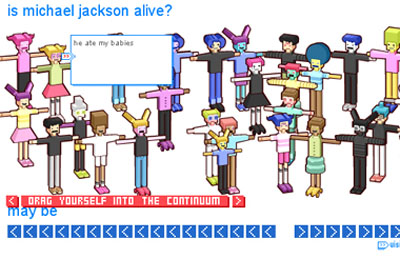
Communiculture.org
You question the term Network Society and prefer to call it a
Class Society. But don't you think that we live in a moment in time
that is characterized by networks - from economies and smart-mobs
to Al Qaeda etc?
It's interesting because there's always been networks, you know.
It is so a-historical to think that, now we are a networked society
but before we weren't. What were the Bolsheviks in Russia but a
network of activists? What were groups of terrorists in the past?
Society is full of networks. It's like a truism. Of course we live
in a network society and to that extend I think it is a meaningless
term.
In your presentation you referred to 'Friendster' as a superficial
social network which I think was a pretty good illustration of Network
Society. The mantra of the Network Society is connectivity hence,
we are afraid of being disconnected and social software such as
Friendster and Orkut reflect this trend by encouraging people to
grow pseudo networks that are much more visual than actual.
Perhaps the term Network Society is really a distraction ... that
not all networks are even. Oh, that's what I forgot to mention!
I think the most basic criteria out there is how do we organize
production. And what is your relationship to that production. That
is class. But people in power all want to distract you from that
simple question because it is totally injust. America considers
itself the most democratic society in the world, yet you don't vote
for the people in the most powerful corporations. You don't get
to vote for your boss at work. Those things are totally top-down
organizations. Corporations are autocratic dictatorships and of
course they'd rather have us think that we live in a network society
than a class society. That fits much better with the ruling class's
view of the world: I am in a network, you are in a network. Yeah,
we are all connected together! We are only 6 people apart! You and
me, we both speak the same language! Whereas with working people
a more meaningful link is the shared relation they have to the system.
Workers must work for a living, under conditions they have little
control over. Workers in US actually have more in commen with the
workers in Iraq and France etc. than they do with their bosses in
the US.
Sebastian Campion is an independent designer based in Amsterdam.
More ...
http://www.exxonsecrets.org
http://www.theyrule.net
http://www.communiculture.org
http://www.futurefarmers.com
http://www.antiwargame.org
|
 |
|